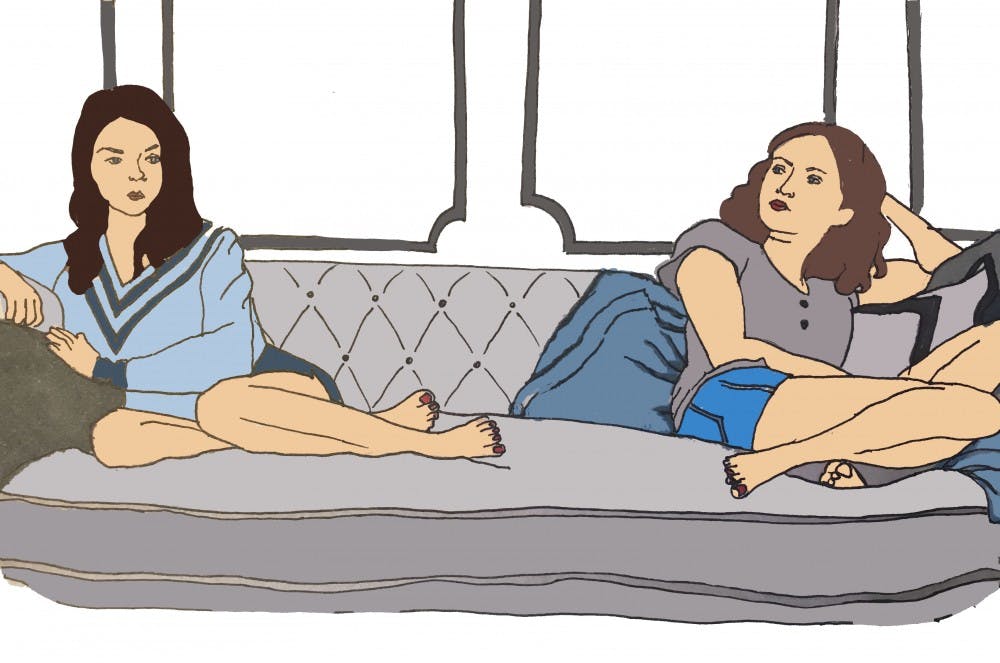I saw the trailer for Thoroughbreds at the Paris Theater in New York at some point in early December. It was the two female leads that eventually made me get out of bed on a Sunday morning just to go all the way to Old City and watch it—at least, this is what it looks like on an ever–growing list of “cool trailers” that I keep on my phone, and which comes in handy specifically in moments like that one.

I must admit, I don’t like knowing too much about movies before I watch them. Thoroughbreds kept popping up on my news feed, though, and while most headlines seemed to praise it, I resisted the urge to read any reviews. If I do that, I’ll either give up the thought of watching the movie altogether, or set my expectations too high, and then be disappointed. In the case of Thoroughbreds, even the faintest of hopes were crushed: as the movie approached its ending, both the intensity of the racket coming from two drunk, middle–aged women—the only ones in the theater who seemed to be having a good time—and the frequency of my own (somewhat) excited notes were basically free–falling.
Cory Finley’s directorial debut is advertised as the story of two high–school girls who embody the main versions of teenage angst—Amanda (Olivia Cooke, Me and Earl and the Dying Girl), who can’t feel anything, and Lily (Anya Taylor–Joy, The Witch), who can feel everything. It’s hard not to roll your eyes at how extreme this sounds, and at the prospect of another exaggerated, romanticized portrayal of mental illness. And, while the two actresses do an incredibly good job capturing their characters’ personalities—if one can speak of any—there’s a sense of superficiality dimming both the script and the plot, which takes away from what would have otherwise been an insightful exploration of two troubled minds.
The setting—an affluent suburb in Connecticut—vaguely reminded me of Lars von Trier’s Melancholia: in both movies, the flamboyance of perfectly–manicured lawns, cellars brimming with vintage wine, and a team of servants waiting to cater to the characters’ needs seems overpowering. Especially in the case of Thoroughbreds, the backdrop looks almost artificial—and, in Balzac’s tradition, so do the characters that inhabit it. Their actions—Lily chews on steamed peas for a bit too long after eating them one by one, with a fork—are meticulous, robotic. Even in the few moments that Lily displays her emotions—Amanda never does, because she doesn’t have any—there’s something about her cries that makes her character’s feelings equally invisible.
As it turns out, neither of the two girls should be relatable in the first place. The film opens with images of Amanda killing a horse with a knife. While, at first, it is she who seems to have more serious issues, as the action progresses it is revealed that Lily is just as troubled, if not more: as she and Amanda plan out the assassination of her stepfather Mark, whom she despises, Lily takes off her sweet, girl–next–door mask, only to reveal a cold–heartedness that reaches its peak when she roofies Amanda and then accuses her of her dad’s murder.
Of course, a movie which is lacking in terms of relatability (at least hopefully) couldn’t do without less–serious moments. These are mostly provided by the late Anton Yelchin’s character Tim, a drug dealer in his twenties who seems to be the only one around who’s puzzled by—and scared of—the two girls. Granted, he’s one of their two victims, and the only surviving one: unlike Mark, Tim takes threats seriously. When hired to kill Lily’s father, Tim is taken to her house only to be threatened, blackmailed, and eventually injured. The scene is, nevertheless, one of the most enjoyable in the film: Tim’s greedy look when exploring the gaudy mansion is accompanied by Schubert’s Ave Maria, which is cut short—as is his reverie—by Amanda’s blank intervention. What follows is his gradual realization that he’s dealing with two sociopaths who will stop at nothing to get what they want.
The one moment in which Thoroughbreds did seem like a thriller occurred, unfortunately, during the ending credits. The inebriated ladies behind me, whose voices I hadn’t heard in a while, were struggling to verbalize their opinions on the movie. Though somewhat incoherently, they managed to reach a conclusion: “oh, all teenagers are the same.” This is where the director’s biggest fault lies: marketing it as the newest teen–drama fails to bring attention to the fact that this is, in the end, a movie about mental illness, and that its portrayal is, to say the least, exaggerated for the sake of its flashiness.
I hope that future viewers walk into the theater knowing that fact. I also hope the two ladies are doing alright, and that the teenagers in their lives are not as heartless to them as they made it seem. After all, their loud laughter partly made some of the movie’s less–than–fortunate script inaudible, for which I can’t help but be grateful.
Rating: 2/5
‘Thoroughbreds’ is currently showing at the Ritz Five.







